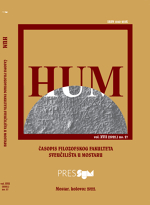MENTALNO ZDRAVLJE I POSTTRAUMATSKI RAST NASTAVNIKA UNIVERZITETA U SARAJEVU TIJEKOM PANDEMIJE COVID-19
MENTAL HEALTH AND POST-TRAUMATIC GROWTH OF THE UNIVERSITY OF SARAJEVO TEACHERS DURING THE COVID-19 PANDEMIC
Author(s): Bisera SofovićSubject(s): Psychology, Clinical psychology
Published by: Filozofski fakultet Sveučilišta u Mostaru
Keywords: mental health; post-traumatic growth; COVID-19; university teachers;
Summary/Abstract: The COVID-19 pandemic has threatened people’s mental health in various ways. Some authors consider it to be a kind of collective trauma, so it is expected that some people are subject to processes that encourage the so-called post-traumatic growth. The aim of this research was to examine the mental health and post-traumatic growth of the University of Sarajevo teachers, as they were faced with a changed way of working. A total of 286 teachers, 181 female and 105 male, age 24-66 years, of all academic titles, completed a questionnaire that included data on age, sex, workplace, perception of changing work tasks, personal experience and experience of close people related to getting sick with COVID-19. Mental Health Inventory, MHI-5 and Post-Traumatic Growth Inventory were applied. The results suggest that university teachers generally maintained their mental health during the pandemic, especially men. Better mental health is associated with a lower rate of post-traumatic growth. It seems that, on average, university teachers have not experienced the pandemic as a traumatic experience. Statistically significant growth was observed in the area of perception of the value of life among teachers who estimated that their work was changed significantly due to the pandemic. No other significant differences were observed regarding the experience of changing work tasks, the workplace and the experience of getting sick with COVID-19. The correlation of mental health and post-traumatic growth with age was also not statistically significant. Since mental health risks exist even in the post-pandemic period, it seems important to pay attention to the psychological well-being of female university teachers, as well as those who perceive that their work tasks have changed significantly due to the pandemic.
Journal: Hum
- Issue Year: XVII/2022
- Issue No: 27
- Page Range: 66-95
- Page Count: 30
- Language: Croatian

